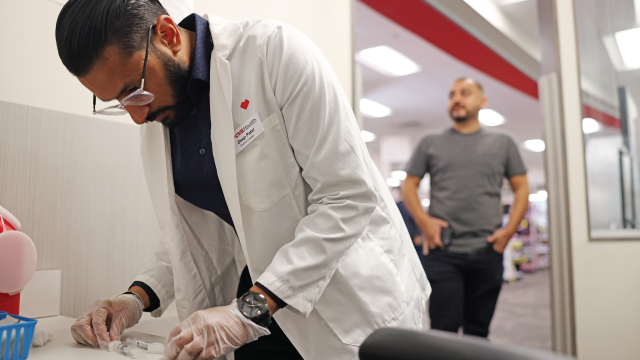
Six-in-ten Americans say they will probably not get an updated 2024-25 COVID-19 vaccine, according to an October Pew Research Center survey. Smaller shares say they probably will get an updated vaccine (24%) or have already received one (15%).
The Centers for Disease Control and Prevention has recommended the updated vaccine to everyone ages 6 months and older ahead of the fall and winter months to help protect from severe disease and hospitalization.
Views of the updated vaccine are sharply divided across partisan lines, with Democrats and those who lean to the Democratic Party being more likely than Republicans and Republican leaners to say they will get the vaccine. The partisan divide is particularly large among adults ages 65 and older – one of the groups most at risk for severe illness.
Pew Research Center conducted this analysis to understand how Americans view the updated COVID-19 vaccine and whether they plan to get one. We surveyed 9,593 U.S. adults from Oct. 21 to 27, 2024.
Everyone who took part in the survey is a member of the Center’s American Trends Panel (ATP), a group of people recruited through national, random sampling of residential addresses who have agreed to take surveys regularly. This kind of recruitment gives nearly all U.S. adults a chance of selection. Surveys were conducted either online or by telephone with a live interviewer. The survey is weighted to be representative of the U.S. adult population by gender, race, ethnicity, partisan affiliation, education and other categories. Read more about the ATP’s methodology.
Here are the questions used for this analysis, the topline and the survey methodology.
Differences in vaccine intent by partisan affiliation and age
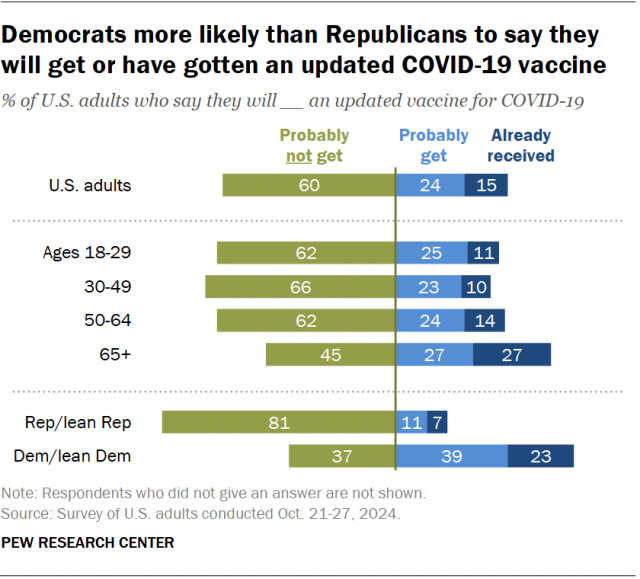
Partisan differences continue to dwarf other factors, including age, when it comes to whether people intend to get a COVID-19 vaccine this season.
Roughly six-in-ten Democrats say they will probably get the vaccine (39%) or already have (23%). By contrast, 81% of Republicans say they probably won’t get the vaccine.
This pattern is consistent with Pew Research Center data from throughout the pandemic showing that Democrats were more likely than Republicans to be up to date with their vaccines.
There are also differences by age in the shares who say they intend to get or already got an updated vaccine. Among adults ages 65 and older, 54% say they either plan to get an updated vaccine (27%) or have already received one (27%). In contrast, majorities of those under 65 say they do not plan to get an updated vaccine.
Age differences among Democrats and Republicans
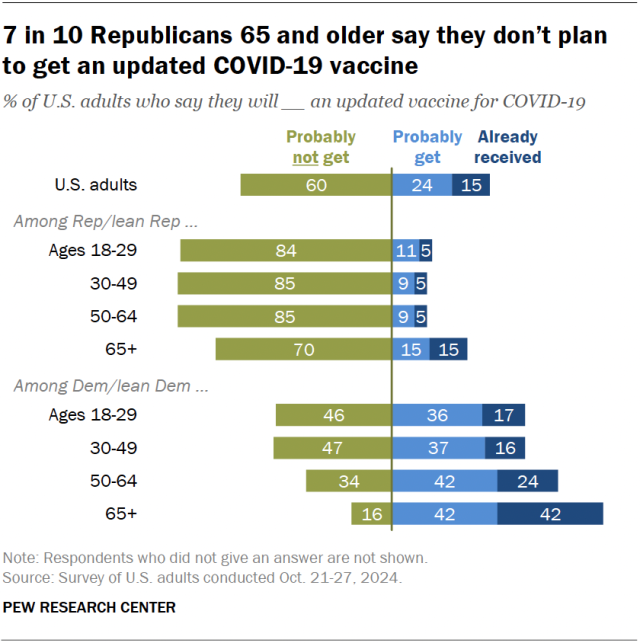
Among adults ages 65 and older, there are big differences by political party in the shares who say they will probably get an updated vaccine. Democrats in this age group are 54 percentage points more likely than their Republican peers to say they plan to get or have already gotten an updated vaccine (84% vs. 30%).
Vaccine uptake among the oldest adults has not always diverged by partisan affiliation to such an extent. In 2021, after the first vaccines became available to all U.S. adults, there was only a 15-point gap between the large shares of Democrats and Republicans ages 65 and older who were fully vaccinated (93% vs. 78%).
There are also differences within each political party by age, but age differences are more pronounced among Democrats than Republicans.
Among Democrats, vaccine uptake increases considerably with age. About half of Democrats ages 18 to 29 and 30 to 49 (53% each) say they plan to get or have already received an updated vaccine. That share rises to 66% among Democrats ages 50 to 64 and 84% among those 65 and older.
Among Republicans, majorities in all age groups say they do not plan to get an updated vaccine. However, the oldest Republicans are somewhat more likely than younger ones to get the vaccine. Three-in-ten Republicans ages 65 and older say they have received or plan to get an updated vaccine, while roughly half as many in younger age groups say the same.
Views by race and ethnicity
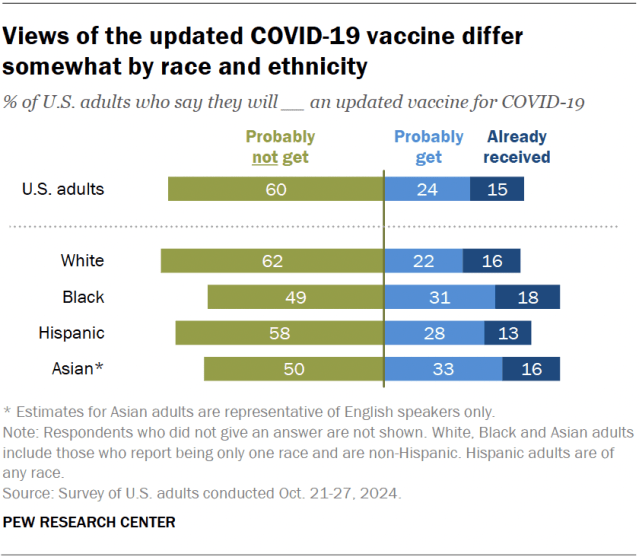
Majorities of White (62%) and Hispanic (58%) adults say they will probably not get an updated COVID-19 vaccine, while Black and Asian adults are evenly divided.
Half of Asian adults and 49% of Black adults say they already received or probably will get an updated vaccine. The same shares say they probably won’t get one. (Our estimates for Asian adults are representative of English speakers only.)
Where Black and Asian adults stand out from White adults is in the shares saying they plan to get an updated vaccine. Black (31%) and Asian (33%) adults are more likely than White adults (22%) to say they will probably get one. Similar shares of all three groups say they have already received one (16% for White and Asian adults, 18% for Black adults). Among Hispanic adults, 28% say they plan to get an updated vaccine and 13% say they have already received one.
White adults are especially divided by partisan affiliation. A majority of White Democrats (69%) say they plan to get or have already gotten an updated COVID-19 vaccine, compared with just 16% of White Republicans. Partisan gaps for other racial and ethnic groups are less pronounced.
Our February survey found that among Americans overall, there was little difference by race and ethnicity in the shares who reported receiving the 2023-24 COVID-19 vaccine, five months after those vaccines were recommended.
Reasons for not getting an updated vaccine
We asked Americans who say they probably won’t get an updated vaccine about four possible reasons for their decision.
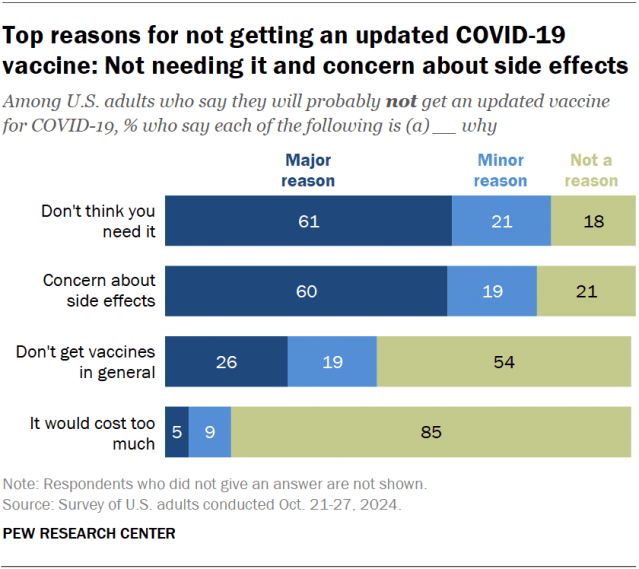
A sense that the vaccine isn’t needed and concern about side effects are the top reasons this group gave. About six-in-ten say each is a major reason why they probably won’t get an updated COVID-19 vaccine. Additionally, about two-in-ten say these are minor reasons why they probably won’t get a vaccine.
A smaller share of those not planning to get an updated vaccine say a major reason why is that they generally don’t get vaccines. Very few cite cost as a major reason.
Concern about side effects and feeling that the updated vaccine is personally unnecessary are the top two reasons regardless of age, party, or race and ethnicity.
Note: Here are the questions used for this analysis, the topline and the survey methodology.

